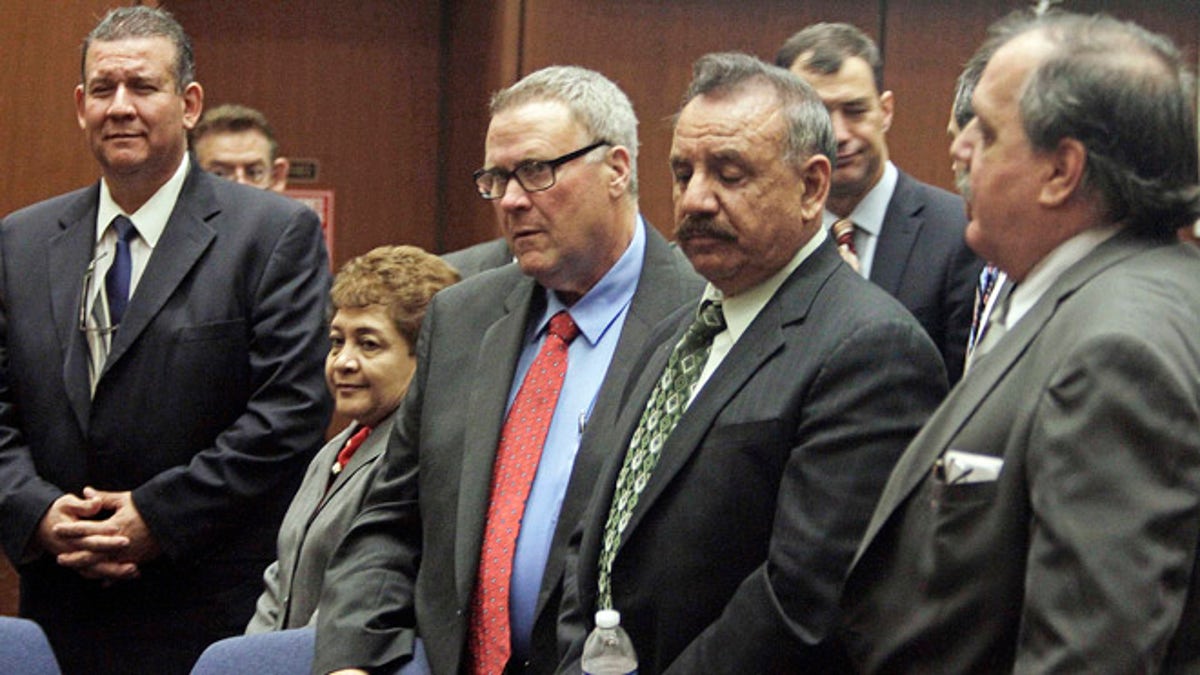
Jan. 24, 2013: In this file photo, former Bell, Calif., city officials appear for a massive city corruption trial in a downtown Los Angeles courtroom. (AP/POOL Los Angeles Times)
LOS ANGELES – Five former elected officials of the small, blue-collar California city of Bell were convicted Wednesday of multiple counts of misappropriating public funds by paying themselves huge salaries while raising taxes on residents.
Former Mayor Oscar Hernandez and co-defendants Teresa Jacobo, George Mirabal, George Cole and Victor Belo were all convicted of multiple counts and acquitted of others.
Former Councilman Luis Artiga was cleared entirely.
The charges against the officials involved paying themselves inflated salaries of up to $100,000 a year in the city of 36,000 people, where one in four residents live below the poverty line.
An audit by the state controller's office previously found the city had illegally raised property taxes, business license fees and other sources of revenue to pay the salaries. The office ordered the money repaid.
The guilty findings were related to the appointment of the defendants to the Solid Waste and Recycling Authority, an agency that prosecutors had argued during trial served no purpose other than to pay them a salary.
All were cleared of charges that they illegally tapped public money while serving on the city's Public Financing Authority. The waste authority was never created legally and met only once in 2006, which boosted pay by about $13,000 per member.
Artiga was found not guilty of a dozen allegations. He was the only defendant who had not served as mayor at some point.
Artiga wept as the clerk read the not guilty verdicts against him, and he thanked members of the community who believed in his innocence.
"I feel righteous and I also feel nothing in my heart against the people that yell at me. I love `em," he said.
His attorney, George Mgdesyan, said Artiga was not involved in the committees where the corruption began.
"We were not there. We did not vote for these authorities, we did not vote for these raises," Mgdesyan said. "My client was there every day working for the city of Bell."
Prosecutors brought an extensive case involving about 100 counts.
After the verdicts were read, Judge Kathleen Kennedy noted there were 10 deadlocked counts and asked the foreman if the panel had exhausted efforts to reach decisions.
He said that was correct, but four other jurors told the judge they thought a verdict could be reached if they received more direction.
Kennedy ordered more deliberations after the lunch recess.
The current jury deliberated since Feb. 28, when one member of an original panel was replaced and the judge told the reconstituted group to start talks anew.
The trial was the first court proceeding following disclosures of massive corruption in the gritty town.
A lawyer for Hernandez said during the trial that his client was unschooled, illiterate and not the type of "scholar" who understood the city's finances.
"We elect people who have a good heart. Someone who can listen to your problems and look you in the eye," attorney Stanley Friedman said.
The scandal that rocked Bell raised the curtain on a fiefdom established by powerful former city manager Robert Rizzo. City records revealed that Rizzo had an annual salary and compensation package worth $1.5 million, making him one of the highest paid administrators in the country.
His salary alone was about $800,000 a year, double that of the president of the United States.
To fund his and other officials' salaries, prosecutors say, Rizzo masterminded a scheme to loot the treasury of $5.5 million. He and his assistant city manager, Angela Spaccia, face their own trial later in the year.
Witnesses at the former council members' trial depicted Rizzo as a micro manager who convinced the city's elected officials that they too deserved huge salaries.
He was said to have manipulated council members into signing major financial documents, particularly Hernandez who could not read what he was signing.
After the scandal was disclosed, thousands of Bell residents protested at City Council meetings and staged a successful recall election to throw out the entire council and elect new leaders.
Jurors heard more than three weeks of testimony and saw numerous documents. But when it came time to deliberate, things did not go well.
A juror who claimed she was being harassed by others on the panel acknowledged she had done research on the Internet about her jury service and discussed it with her daughter. The judge found she had committed misconduct and, after five days of deliberations, the weeping juror was dismissed from the panel.




